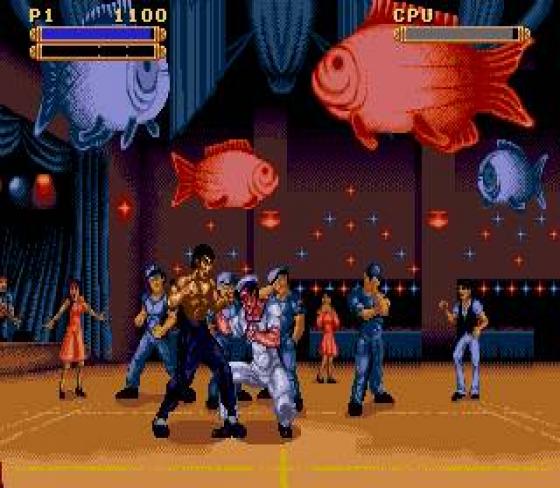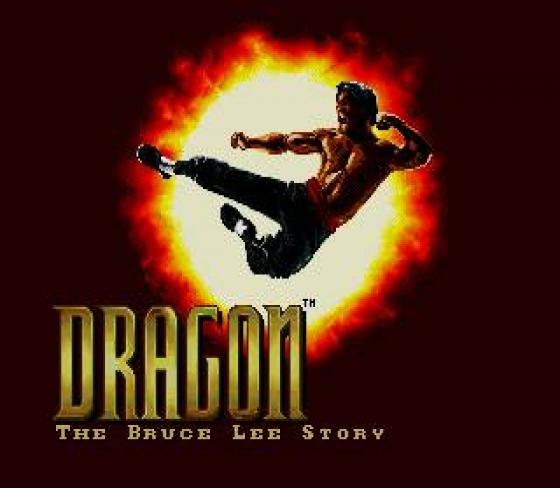
Mean Machines Sega
 1st June 1994
1st June 1994
Categories: Review: Software
Publisher: Virgin Games
Machine: Sega Mega Drive (EU Version)
Published in Mean Machines Sega #21
Dragon: The Bruce Lee Story
It seems to us that Dragon: The Bruce Lee Story, was a very flowery interpretation of the actor's life. Granted, he was indeed the greatest martial artist in cinema history, but some of the stuff he got up to in that film? Like scrapping seven or eight cleaver-swinging chefs at once? Hmmmm.
Still, if the film was a true representation of his life, Virgin have every right to breathe a sigh of relief. If Hollywood is to be believed, Bruce made his way through life via a series of superb fights which start with him taking on a load of American sailors, doing the same to the aforementioned chefs, and eventually making his mark in films like 'The Big Boss' by... er, fighting more people. Virgin have recreated these in the eleven stage beat-'em-up that is Dragon, setting each battle within a scrolling play area. Mind you, I hope they've skipped over the soppy lovey-dovey bits and the bit where Bruce breaks his back, as they were really dull. And the latter wouldn't allow for any special moves...
Origin
Bruce Lee is probably the single most famous martial arts expert of all time. Dragon is based on the film of his life.
Game Aim

As Bruce, your one task in life is to smash seven shades out of anyone you meet. If that's true of his life, I'm glad I never met him...
Enter The (Little) Dragon
Dragon picks out key fight scenes from the film, starting with his fight against a chain-wielding sailor, and moving on to a fight against a cook armed with a meat cleaver. Digitised pictures lifted from the film set the scene for the forthcoming fight scenes and keep the player posted of Bruce's life. Similarly, the game follows Bruce's entry into the world of films, most notably a two-stage fight on the set of 'The Big Boss'.
Other aspects have been taken from the film and cleverly used in the game, too, including three mirrors Bruce's dad gave him which are used to symbolise his remaining lives, and a series of sub-games which test his speed and agility and were used to gauge his increasing prowess on the big screen.
Bruce Lee 2

In addition to the one-player mode, a second player can join in for a bit of a scrap too. Virgin's developers had originally hoped to use, Bruce's wife, Linda Lee, as the secondary player, but this never came off, so a second Bruce sprite has been used instead, albeit in a different coloured pair of strides. This second fighter does have the disadvantage of removing the second chef who appears in the kitchen though.
Chi For Two
As with most beat-'em-ups, Bruce's energy is shown as a bar at the top of the screen. Directly below this, though, is a secondary bar which denotes the power of Bruce's 'Chi' - mystical power. By moving to the left-hand side of the screen and pressing the Start button in conjunction with the pad Bruce's move configurations are altered slightly, adding such special moves as somersaults and speed kicks to his inventory.
Samurai Showdown
In the film, at key turning points in his life, Bruce's dreams are haunted by a towering Samurai demon. Bruce finds himself in a smoke-filled graveyard with the spectral warrior bearing down on him for a fight to the death - one Bruce eventually loses. The game uses the Samurai as its final boss, but whenever Bruce's three lives are lost, a timed fight against the warrior allows the player to continue. Providing they beat him, that is...
Steve

Dragon is the perfect game for a beat-'em-up licence. In the film, Jason Scott-Lee takes on up to eight people at a time, the characters come ready-made as cleaver-wielding chefs, and cinematic enemies attack Bruce as he goes through life.
From the early version I saw, Dragon seemed like it was going to live up to the film's promise, but the final game is let down by some hideous game flaws. For example, during the head of a fight, Bruce is often stunned and there's no way of bringing him around, thus allowing the opposition to claim even more of his energy.
In addition, the assorted moves are a little slow to pull off and this makes the levels even more frustrating.

Dragon could have been such a good game. It looks good with its massive sprites and clever moves, but fundamental mistakes leave Dragon in the "missed opportunity" category.
Gus
I'm not a Bruce Lee fan, and I haven't seen Dragon, but I know a good beat-'em-up when I see one... and this isn't an example.
Dragon falls prey to the kind of gameplay flows that imperil every beat-'em-up. First, as Steve mentioned, the "powerless while stunned" syndrome. This trick is used when an opponent is too easy to beat, so the programmer takes the control of the character away from the player.

Secondly, "repetitive move syndrome", in this case Bruce's flying kick. I'm also unhappy wth the lack of moves - even taing the two other Chi modes into account - hardly matches up to Eternal Champions' 60-odd moves, or its choice of eight characters, for that matter.
Dragon's an attempt to give a new gloss to combat games, but the mechanics just aren't there.
Verdict
Graphics 90%
P. Large sprites, and superbly-detailed backdrops. Instantly recognisable from their filmic counterparts.

Sound 84%
P. Varied music and all the usual biffs, punches and groans.
N. The effects aren't exactly all they could be.
Playability 76%
P. Beat-'em-ups are always fun to get to grips with.
N. But Dragon's sluggish controls and unfair gameplay faults prevent full enjoyment.
Lastability 76%
P. Plenty of opponents, and the final boss is tough.
N. Irritating faults ruin what could have been an excellent licence.
Value For Money 78%
N. At 16MEG, this game just doesn't have enough playability to warrant a buy.
Overall 77%
The perfect beat-'em-up licence is wasted in a game which is just like a Bruce Lee film: impressive to look at but no real contact.




